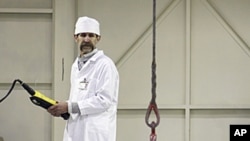The United States and leading European suppliers of medical isotopes say they will move away from the use of weapons-grade highly enriched uranium (HEU) to a less potent form of the material, in a push to boost global nuclear security.
US, no more HEU
Medical isotopes are used in the treatment of cancer and heart disease. Scientists have been working to shift away from HEU to low-enriched uranium because the highly enriched material can be used to build nuclear bombs.
U.S. Energy Secretary Steven Chu announced the deal Monday at a global energy summit in the South Korean capital Seoul attended by U.S. President Barack Obama and more than 50 other world leaders.
"We are reducing the availability of highly enriched uranium, weapons grade useable material, and it reduces the chance of the material falling into the wrong hands. Currently, Moly-99, which is used to produce a medical isotope involved in 100,000 medical procedures everyday, is produced by Asian facilities primarily using highly enriched uranium," Chu explained. "And through this 4-party collaboration, the United States will assist Belgium, France, and the Netherlands in converting existing isotope production facilities from the use of highly enriched uranium targets, to low enriched uranium targets by 2015."
President Obama targeted nuclear security goals early in his first term, and launched the first such nuclear summit in Washington two years ago.
HEU removed from Ukraine soil
The president announced on Sunday that Ukraine has removed all highly enriched uranium (HEU) from its soil, fulfilling a pledge made at the 2010 summit.
Kazakhstan, once host to part of the Soviet nuclear arsenal, has secured more than 13 tons of HEU and plutonium in the past two years, while the United States and Russia have agreed to dispose of enough plutonium for 17,000 nuclear weapons.
However, the International Panel on Fissile Materials - an independent group of specialists from 16 countries - says global stocks of HEU stand at more than 1,400 tons, while nations maintain about 500 tons of plutonium. About half of that plutonium is suitable for making nuclear weapons.
Organizers say the ongoing summit will also discuss ways to protect nuclear materials used in everyday life, as well as ways to cooperate more closely to improve border controls and ensure against nuclear smuggling.
Some information for this report was provided by AP.





